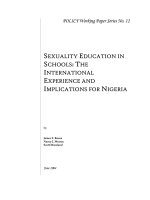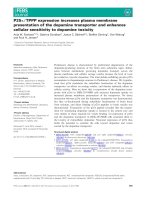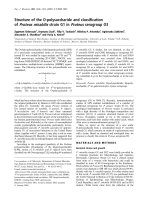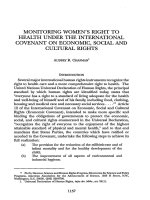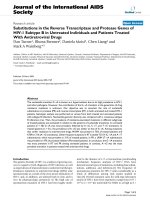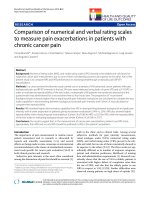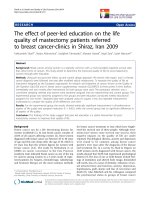mandatory obligations under the international counter-terrorism and organised crime conventions to facilitate state cooperation in law enforcement
Bạn đang xem bản rút gọn của tài liệu. Xem và tải ngay bản đầy đủ của tài liệu tại đây (2.54 MB, 346 trang )
Glasgow Theses Service
Hameed, Usman (2014) Mandatory obligations under the international
counter-terrorism and organised crime conventions to facilitate state
cooperation in law enforcement. PhD thesis.
Copyright and moral rights for this thesis are retained by the author
A copy can be downloaded for personal non-commercial research or
study, without prior permission or charge
This thesis cannot be reproduced or quoted extensively from without first
obtaining permission in writing from the Author
The content must not be changed in any way or sold commercially in any
format or medium without the formal permission of the Author
When referring to this work, full bibliographic details including the
author, title, awarding institution and date of the thesis must be given.
Mandatory obligations under the international
counter-terrorism and organised crime
conventions to facilitate state cooperation in law
enforcement
A thesis submitted in fulfilment of the requirements for the
Degree of
Doctor of Philosophy at
University of Glasgow
School of Law
College of Law, Business and Social Science
By: Usman Hameed LL.M (Sheffield)
Supervisors: Dr. James Sloan and Professor Christian Tams
January 2014
ii
Abstract
The UN-sponsored international conventions on terrorism and organised crime
deal with a specific type of criminality which spreads across national frontiers.
The suppression of these crimes is possible through state cooperation in
extradition and mutual legal assistance. Hence, the object of these conventions
is to facilitate law enforcement cooperation. To achieve this aim, the
conventions have established certain mandatory obligations in order to ensure
harmony among the legal systems of states parties with a view to make them
conducive to law enforcement cooperation.
Harmony is needed to satisfy certain requirements of extradition and mutual
legal assistance proceedings which necessitate similarity in the legal systems of
the requesting and requested states. These requirements can be classified into
distinct categories of conditions and procedure.
Conditions refer to conditions associated with the principle of reciprocity or
exchange of comparable favours, upon which the laws and treaties on
extradition and mutual legal assistance are based. It demands similar legal
prescriptions or equivalent conceptions of justice under the laws of the
requesting and requested state with respect to the act concerning which
surrender or interrogation is sought. To enable the parties to satisfy conditions,
the international conventions impose mandatory obligations to implement their
rules concerning jurisdiction, criminalisation and fair treatment.
Procedure implies the procedure of applying or executing the enforcement
devices of aut dedere aut judicare and confiscation of the proceeds of crime.
The application of both these devices necessitates similarity in the laws of the
requesting and requested states with respect to procedure of enforcement.
Similarity is needed to ensure that a foreign request may not be refused due to
the requested state lacking enabling procedural rules or the request not being
consistent with its procedural law. To establish similarity, the conventions
impose mandatory obligations to implement the mechanisms of aut dedere aut
judicare and confiscation of the proceeds of crimes. This thesis critically
iii
examines the impact of these obligations on state cooperation in bringing to
justice transnational offenders.
The central argument of the thesis is that the mandatory obligations under the
counter-terrorism and organised crime conventions are required to be
implemented in accordance with and, to the extent permissible, under the
national law of state parties. Accordingly, when they are translated
domestically, they do not achieve a level of harmony, sufficient to facilitate the
fulfilment of the requirements of extradition and mutual legal assistance, i.e.
‘double conditions’ and procedural similarity needed to enforce aut dedere aut
judicare and confiscation. Resultantly, discretion rests with the requested state
to grant or refuse cooperation depending upon its political and diplomatic
relations with the requesting state. This contradicts the objective of facilitating
law enforcement cooperation in the specific context of borderless or
transnational crimes. Following this approach, state cooperation concerning
transnational crimes remains as discretionary and as unregulated as cooperation
in regard to ordinary crimes. This calls into question the utility of reliance on
mandatory obligations as tools to facilitate law enforcement cooperation.
As an alternative, some bilateral/regional treaties and domestic laws adopt the
strategy of relaxing ‘double conditions’ and simplifying the procedure of
applying aut dedere aut judicare and confiscation. This strategy also aims at
facilitating law enforcement cooperation; however, it takes the route of
regulating the requirements of extradition and mutual legal assistance rather
than harmonising national justice systems to make them conducive to their
demands. Given that this system carries greater potential for facilitating law
enforcement cooperation, this thesis recommends that the makers of the
international counter-terrorism and organised crime conventions should
substitute or complement the mandatory obligations with it. Significantly, states
have, by agreeing not to apply political and fiscal offence exception to
extradition and interrogation proceedings involving these crimes, shown their
willingness to accept this approach of facilitating law enforcement cooperation
in the specific context of transnational crimes.
iv
Table of Contents
Contents
Title i
Abstract ii
List of Tables xii
Acknowledgement xiii
1.1 Table of Cases xiv
1.2 Table of Treaties xvii
1.3 Table of national legislations xxi
1.4 Table of United Nations Resolutions xxvi
Author’s Declaration xxvii
Abbreviations xxviii
Glossary xxxii
Chapter 1: Introduction 1
1.1) Introduction to part one: mandatory obligations to establish
jurisdiction, criminalise offences and provide fair treatment 3
1.2) Introduction to part two: mandatory obligations to implement
enforcement devices of aut dedere aut judicare and confiscation of the
proceeds of crime 5
1.3) Counter-terrorism and organised crime conventions under consideration 6
1.3.1) Convention for the Suppression of Unlawful Seizure of Aircraft Signed
at The Hague, on 16 December 1970 7
1.3.2) Convention for the Suppression of Unlawful Acts against the Safety of
Civil Aviation, Signed at Montreal, on 23 September1971 8
1.3.3) Convention for the Prevention and Punishment of Crimes against
Internationally Protected Persons, including Diplomatic Agents, Adopted by
the General Assembly of United Nations on 14 December 1973 8
1.3.4) International Convention against the Taking of Hostages Adopted by
the General Assembly of the United Nations on 17 December 1979 8
1.3.5) Convention on Physical Protection of Nuclear Materials, Signed at
Vienna on 3 March 1980 9
1.3.6) Convention for the Suppression of Unlawful Acts against the Safety of
Maritime Navigation, concluded at Rome on 10 March 1988 9
1.3.7) International Convention for the Suppression of Terrorist Bombings,
Signed at New York on 15 December 1997 9
1.3.8) International Convention for the Suppression of the Financing of
Terrorism, Adopted by the General Assembly of United Nations on 9
December 1999 9
v
1.3.9) International Convention for the Suppression of Acts of Nuclear
Terrorism, Adopted at New York on 13 April 2005 10
1.3.10) Convention on the Suppression of Unlawful Acts Relating to
International Civil Aviation, Adopted at Beijing on 10 September 2010 10
1.3.11) United Nations Convention against Illicit Traffic in Narcotic Drugs
and Psychotropic Substances 1988, Adopted at Vienna on 20 December 1988
10
1.3.12) United Nations Convention against Transnational Organized Crime,
Adopted at New York on 15 November 2000 11
1.3.13) United Nations Convention against Corruption, Adopted at New York
on 31 October 2003 11
1.4) Distinction between Security Council's counter-terrorism regime and the
regime set forth by the international counter-terrorism and organised crime
conventions 12
1.5) Do international conventions on terrorism and organised crime establish a
supra national regime? 15
1.5.1) Distinction between the existing and proposed techniques of
facilitating law enforcement cooperation and willingness of states to accept
proposed technique 17
1.6) The fundamental issues discussed in the thesis 18
1.7) Objective of the thesis 19
1.8) Research question 20
1.9) Novelty of the thesis 22
1.10) Scope of the thesis 23
Part one: Mandatory obligations to establish jurisdiction, criminalise offenses
and provide fair treatment 28
Chapter 2: Facilitation of law enforcement cooperation through the obligation
to establish extraterritorial jurisdiction 29
Introduction 29
Section 1: Purpose of the obligation to establish extraterritorial jurisdiction
under the international conventions on terrorism and organised crime 31
1.1) Territoriality of crime no longer an option 31
1.1.1) Lotus Case 33
1.2) Significance of extraterritorial jurisdiction for combating crimes
established by the international conventions on terrorism and organised crime
33
1.3) Meanings of extraterritorial jurisdiction 35
1.3.1) Argument that extraterritorial jurisdiction includes legislation,
enforcement and adjudication 35
1.3.2) Argument that extraterritorial jurisdiction refers to the legislative
jurisdiction alone 36
1.4) Rationale of having extraterritorial laws without power to enforce 39
vi
Section 2: Bases provided by the international counter-terrorism and organised
crime conventions to give extraterritorial effect to national laws and the impact
of the obligation to implement those bases 41
2.1) Grounds customarily relied on by states to assert jurisdiction over crime
41
2.1.1) Territoriality 42
2.1.2) The active personality or nationality theory 43
2.1.3) The passive personality theory 43
2.1.4) The Protective principle 44
2.1.5) The Universality Principle 44
2.2) Bases of jurisdiction under the international conventions on terrorism
and organised crime 45
2.2.1) Primary bases of jurisdiction provided by the counter-terrorism
conventions 46
2.2.2) Primary bases of Jurisdiction under the organised crime conventions
51
2.2.3) Secondary basis 53
2.3) Mandatory bases - a move towards uniformity 53
2.4) Permissive bases - A move towards diversity 54
2.5) Impact of the obligation to establish extraterritorial jurisdiction on
national laws 55
2.5.1) Laws of Pakistan and India on terrorism and organised crime 55
2.5.2) US laws on terrorism and organised crime 57
2.5.3) Laws of the UK on terrorism and organised crime 59
Section 3: Fulfilment of legality principle and the condition of crime having
occurred on state territory through the obligation to establish extraterritorial
jurisdiction 60
3.1) Principle of Legality 61
3.2) Requirement of crime having occurred in the territory of the requesting
state 62
Section 4: Fulfilment of special use of double criminality through the obligation
to establish extraterritorial jurisdiction 65
4.1) Special use of double criminality 65
4.1.1) Lack of harmony in national theories of jurisdiction and its
implications for state cooperation in law enforcement 69
4.1.2) Inconsistent theories of jurisdiction- A contradiction of the aim of
facilitating state cooperation in law enforcement 76
4.1.3) Flexibilities in the obligation to establish extraterritorial jurisdiction
78
4.2) Alternatives to Uniformity 81
Conclusions 83
Chapter 3: Promoting law enforcement cooperation through the obligation to
legislate against universal definitions of crime 86
vii
Introduction 86
Section 1: Crimes established by the international conventions on terrorism and
organised crime, the object of their international criminalisation and relevance
of dual criminality for their suppression 88
1.1) Acts criminalised under the international conventions on terrorism and
organised crime 88
1.1.1) Principal crimes under the counter-terrorism conventions 89
1.1.2) Principal crimes under the organised crime conventions 90
1.2) The object of international criminalisation 91
1.2.1) Measures of state cooperation are to be enforced subject to the
Requesting state fulfilling the demands of principle of reciprocity 93
1.3) Relevance of double criminality for suppression of crimes established by
the international conventions on terrorism and organised crime 94
Section 2 Duty to legislate under modern international conventions on terrorism
and organised crime 97
2.1) Significance of the duty to legislate 97
2.2) Evolution of the duty to legislate in the international conventions on
terrorism and organised crime 100
2.2.1) Analysis of definitions of crimes under the older and modern counter-
terrorism conventions 101
2.3) Complications arising in law enforcement cooperation as a result of
diverse national definitions of crimes 103
2.3.1) Adnan Khashoggi case 103
2.3.2) Ross v Israel 105
2.3.3) Riley v. the Commonwealth 106
2.4) The international conventions establishing duty to legislate 108
2.4.1) Counter-Terrorism Conventions 108
2.4.2) Organised Crime Conventions 108
2.5) Distinguishing features of the conventions establishing duty to legislate
109
2.5.1) Inchoate offences 110
2.5.2) Ancillary crimes 111
2.6) Limitations of Duty to Legislate 113
2.6.1) Offences are to be defined in accordance with national law of the
states parties 113
2.6.2) Safeguard clauses 113
2.6.3) Reservations 114
2.6.4) Use of the words ‘unlawful’ and ‘intentional’ in definitions of
offences 115
2.6.5) Discretion in the matter of establishing predicate crimes 115
Section 3: Impact of duty to legislate 118
viii
3.1) Impact of duty to legislate on national counter-terrorism and organised
crime laws 118
3.1.1) counter-terrorism laws 118
3.1.2) organised crime laws 122
3.2) Impact of the duty to legislate on bilateral treaties 125
Section 4: Controlled use of dual criminality as an alternative to duty to
legislate 128
4.1) Totality of the acts shall be considered for satisfaction of dual criminality
129
4.2) An offence to be extraditable irrespective of different terminology used
by the cooperating states with respect to its expression 130
4.3) Where an offence is extraditable, attempt, conspiracy, planning and
abetment are also extraditable 130
4.4) Non-Application of dual criminality in mutual legal assistance 131
4.5) Making non- Retroactivity less relevant 132
Conclusions 133
Chapter 4: Promoting law enforcement cooperation through the obligation to
provide fair treatment 136
Introduction 136
Section 1: Requirement of harmony for extradition and mutual legal assistance
and use of human rights violations as grounds for refusal of assistance 138
1.1) Double punishability condition 141
1.2) Use of human rights violations as grounds for refusal of assistance 142
Section 2: Obligation to provide fair treatment, its interpretation and
significance in the context of state cooperation in extradition and mutual legal
assistance 144
2.1) Introduction to Fair Treatment Obligation 144
2.1.1) Interpretation of the obligation 146
2.2) Significance of the obligation 148
Section 3: Effectiveness of the fair treatment obligation in facilitating the
fulfilment of due process rights as grounds for refusal of assistance 149
3.1) Right to be protected against double jeopardy 150
3.1.1) Dissimilarities in national approaches concerning the use of double
jeopardy as a ground for refusal of assistance 151
3.1.1.1) Recognition of the principle in extradition and mutual legal
assistance proceedings 151
3.1.1.2) Forum of previous conviction 153
3.1.1.3) Offences or facts 156
3.2) Right to be protected against time-barred prosecutions 159
3.2.1) Dissimilarities in national approaches concerning the use of time-
barred prosecution as a ground for refusal of assistance 161
ix
Section 4: Effectiveness of the fair treatment obligation in facilitating the
fulfilment fundamental human rights as grounds for refusal of assistance 168
4.1) Right to be protected against torture 168
4.1.1) Need to reconcile the prohibition against torture with the severe
punishment requirement of transnational criminality 170
4.1.2) Dissimilar national and regional approaches with respect to
considering severe punishments as torture 172
4.1.3) Diplomatic assurance as an alternative 176
4.2) Non Discrimination and freedom from persecution 178
4.2.1) Absence of any universal standard to determine prejudice on account
of political opinion 180
Conclusions 182
Part two: Mandatory obligations to implement the enforcement mechanisms of
aut dedere aut judicare and confiscation of the proceeds of crime 185
Chapter 5: Promoting law enforcement cooperation through duty to implement
aut dedere aut judicare 186
Introduction 186
Section 1: Expression of aut dedere aut judicare in the international conventions
on terrorism and organised crime and its implementation in national laws and
bilateral treaties on extradition 189
1.1) Evolution of aut dedere aut judicare 189
1.2) Meanings of the maxim 190
1.3) Expression of aut dedere aut judicare in the counter- terrorism and
organised crime conventions 192
1.3.1) Counter-Terrorism Conventions 192
1.3.2) Organised Crime Conventions 194
1.3.3) Dissimilarities in the aut dedere aut judicare formula as contained
in the Hague Convention 1970 and three organised crime conventions 195
1.4) Expression of aut dedere aut judicare in domestic laws 197
1.5) Expression of aut dedere aut judicare in bilateral and regional treaties
on extradition 199
Section 2: Application of aut dedere aut judicare in accordance with national
law 202
2.1) Duty to apprehend the suspect 203
2.1.1) Duty under the international conventions on terrorism and organised
crime 203
2.1.2) Implementation of the duty in extradition treaties 204
2.2) Judicare part of the obligation 207
2.2.1) Duty to submit the case to competent authorities for consideration
207
2.2.2) Prosecution to be governed by national rules on prosecution of
offenders 209
2.3) Dedere part of the obligation 210
x
2.3.1) Obligation to consider the crimes extraditable 211
2.3.2) Obligation to consider the international conventions as a legal basis
of surrender 213
Section 3: Regulation of the procedure of extradition under the international
conventions on terrorism and organised crime 215
3.1) The fiscal offence exception 216
3.2) The political offence exception 217
3.3) Temporary Surrender 220
Section 4: Facilitating the application of aut dedere aut judicare as a whole in
the specific context of transnational crimes 222
4.1) Facilitating the application of trial option of aut dedere aut judicare 222
4.1.1) Lack of extraterritorial jurisdiction to prosecute crimes committed
abroad by non-national offenders 222
4.1.2) General lack of trust upon credibility of trial as an alternative to
extradition 225
4.1.3) Alternative options 226
4.1.4) The problem of competing jurisdictions and the absence of hierarchy
in the alternative obligations 228
4.2) Facilitating the application of extradition option of aut dedere aut
judicare 236
4.2.1) Restricted application of the principle of speciality 236
4.2.2) Surrender of property and mutual legal assistance in extradition 238
Conclusions 240
Chapter 6: Facilitation of law enforcement cooperation by imposing duty to
confiscate, identify and freeze the proceeds or instrumentalities of crime 242
Introduction 242
Section 1: Introduction to confiscation and its significance for bringing to justice
transnational offenders 244
1.1) Transnational criminality and the importance of confiscation for its
suppression 244
1.2) Introduction to the different steps in the process of state cooperation in
confiscation 246
Section 2: Analysis of provisions of the conventions concerning empowerment of
national law enforcement authorities and execution of foreign requests of
confiscation 248
2.1) Empowerment of national law enforcement authorities to identify, trace,
freeze and confiscate the proceeds of crime 248
2.1.1) Meanings of the terms used in the provisions 248
2.1.2) Provisions to be implemented to the extent permissible under
national law 249
2.1.3) Inconsistent domestic implementation and its implications 250
2.2) Execution of foreign requests 253
xi
2.2.1) Execution of a foreign confiscation order: either to execute or to
submit for consideration 254
2.2.2) Execution of a foreign freezing, tracing and seizure order 257
2.3) Confiscation of intermingled, converted proceeds and protection of third
party rights 258
2.3.1) Meanings of intermingled and converted proceeds 259
2.3.2) Meanings of third party protection 263
Section 3: Obligation to provide Mutual Legal Assistance under the international
conventions on terrorism and organised crime 267
3.1) Explanation of mutual legal assistance 267
3.2) Mutual legal assistance provisions of the international conventions on
terrorism and organised crime 268
3.2.1) Subordination to national law and bilateral treaties 270
3.2.2) Mutual Legal assistance provisions concerning identification, tracing,
seizure and freezing 271
3.2.3) Voluntary or spontaneous information 274
3.2.4) Disposal and sharing of the proceeds 276
3.2.5) Grounds for refusal of mutual legal assistance 279
3.2.6) Factors on the basis of which mutual legal assistance may not be
refused 282
Conclusion 284
Chapter 7: Concluding Appraisal 286
1.1 Suggestions for improvement 287
1.1.1) Relaxing the application of special use of double criminality 289
1.1.2) Relaxing the application of double criminality 289
1.1.3) Regulating the double punishability requirement 290
1.1.4) Simplifying the procedure of aut dedere aut Judicare 292
1.1.5) Simplifying the procedure of confiscation upon foreign request 293
1.2) Compatibility of the proposed technique with aims and purposes of the
counter-terrorism and organised crime conventions and its utility in regard to
modernisation of extradition and mutual assistance laws 295
Bibliography 297
Web Resources 309
xii
List of Tables
1.1 Table of Cases xiv
1.2 Table of Treaties xvii
1.3 Table of national legislations xxi
1.4 Table of United Nations Resolutions xxvi
xiii
Acknowledgement
I am immensely grateful to Dr James Sloan and Professor Christian Tams, my
Supervisors for their encouragement, support and guidance in the course of this
thesis. They have both been amazingly generous with their time and support,
going far beyond what I could have expected. Their suggestions on my thesis,
inspiring discussions, insightful and penetrating comments and criticism made
our supervisory meetings interesting and unforgettable. I also found them to be
extraordinary human beings as they provided all kind of emotional support
during my illness and surgery. I would also like to thank Susan Homes, Post
graduate Administrator for being reliable, caring and supportive.
I am indebted to Prof. Dr. Akram Chaudhray, the Vice Chancellor University of
Sargodha Pakistan for making it possible for me to undertake a PhD project at
Glasgow, UK. Indeed, without his efforts, I would not even have begun my
project let alone completing it.
I would like to thank my wife Aneela Usman who has had to live without her
husband for a prolonged period of time and to manage everything back home on
her own. Her tireless support and unconditional love indicate that I am lucky
enough to have a reliable and strong-willed life partner. A word of thanks is also
due to my lovely daughters, Amna and Annaya for understanding why daddy
could not be there with them. Lastly, I wish to thank my father whose emotional
and moral support has been invaluable during my stay abroad. My debt to all of
them is enormous.
Usman Hameed
Glasgow, January 2014
xiv
1.1 Table of Cases
International and Regional Cases
S.S. Lotus (Fr. v. Turk.), 1927 P.C.I.J. (ser. A) No. 10 (Sept.7)
Questions of Interpretation and Application of the 1971 Montreal
Convention Arising from the Aerial Incident at Lockerbie (Libyan Arab
Jamahiriya v. United Kingdom), Provisional Measures, 1992 ICJ Reports 3
(Apr 14)
Case Concerning Military and Paramilitary Activities in and Against
Nicaragua (Nicaragua v. United States of America); Merits, International
Court of Justice (ICJ), Judgement of 27 June1986 [1986] ICJ Rep 14
Questions relating to the Obligation to Prosecute or Extradite (Belgium v.
Senegal), ICJ Reports 2012, Judgement of July 20, 2012
Othman (Abu Qatada) v. the United Kingdom – 8139/09 [2012] ECHR 56
Soering v. The United Kingdom, 1/1989/161/217,Council of Europe:
European Court of Human Rights, 7 July 1989
Chitat Ng v. Canada, Communication No. 469/1991, U.N. Doc.
CCPR/C/49/D/469/1991 (1994)
Case of Babar Ahmad and Others v. the United Kingdom(Applications nos.
24027/07, 11949/08, 36742/08, 66911/09 and 67354/09) ECtHR (Fourth
Section) Admissibility Decision of 6 July 2010
Case of Babar Ahmad and Others v. the United Kingdom EctHR (Fourth
Section) Strasbourg Judgment 10 April 2012
Kafkaris v. Cyprus [GC], no. 21906/04 ECHR 2008
Saadi v. Italy, No. 32201/06, 128 (Eur.Ct. H.R. Feb 2, 2008
Domestic Cases
MacLeod v Attorney General for New South Wales [1891] AC 455, 458
Somchai Liangsiriprasert v. United States Government [1990] 2 ALL ER 866
xv
US v. Alvarez Machain 504 US 655 (1992)
US v. Yunis (1988) 681 F. Supp (D.D.C) 909
A G. Israel v. Eichmann, (1968) 36 ILR 5 (District Court, Jerusalem)
In re Stupp 23 F.Cas.281 (C.C.S.D.N.Y.1873) (No.13562)
In re Lo Dolce 106 F. Supp. 455 (W.D.N.Y. 1952)
In re ryat, Unreported, QDB,1989
R. V. Bow Street Metropolitan Stipendiary Magistrate exparte Pinochet
Urgate (Amnesty International and others intervening) (No.3), 2 ENG. Rep
97,170 (H.L 1999) [1999] 2 W.L.R 827
R. (on the application of Bermingham) v Director of the Serious Fraud
Office and Bermingham and others v the Government of the United States
of America and the Secretary of State for the Home Department [2006]
E.W.H.C. 200 (Admin); [2007] Q.B. 727; [2007] 2 W.L.R. 635
Abu Daud case, Judgement of Jan.11, 1977, Chambre d' Accusation De La
CourD' appel Paris
McKinnon v United States (2007) EWHC 762 (Admin); (2007) 157 N.L.J.
554; McKinnon v Government of the USA, [2008] U.K.H.L. 59
Strassheim v. Daily, 221 U.S. 280 (1911)
Assarsson case, 635 F.2d 1237 (7
th
Cir 1979)
Factor v. Laubenheimer 90 U.S. 276 (1933)
US V. Khashoggi 717 F. Supp.1048 (1989)
Steven Ivan Ross v. State of Israel (1973) (II) 27 P.D. 365
Riley and Butler v. Commonwealth, 260 ALR 106 (Austrl. 1985)
Canada v. Aronson [1989] 2 All E.R. 1025
R. v. Parisien [1988] 1 S.C.R. 950
Kim Dotcom, et al., v. United States of America Judgement of 29 May
2012 in the District Court at North Shore in the matter of a request by the
xvi
Government of United States of America for the surrender of persons in
New Zealand
United States of America v. Kim Dotcom, et al., Criminal no. 1:12 CR 3 US
District Court Alexandra Virginia, Indictment 5 January, 2012
Regina v. Bartle and the Commissioner of Police for the Metropolis and
Others Ex Parte Pinochet & Regina v. Evans and Another and the
Commissioner of Police for the Metropolis and Others Ex Parte Pinochet
(On Appeal from a Divisional Court of the Queen's Bench Division)
In re John Anderson, 20 U.C.Q.B.R. 124 (1860)
Canada v. Schmidt [1987] 1 S.C.R 500 AT 501-502(CAN)
Jeffrey Phillip Kamrin v. United States of America, 725 F.2d 1225, Decided
by United States Court of Appeals Ninth Circuit on Feb 14, 1984
Judgment of Swiss Magistrate in SGS, Cotecna case
< />a7d8a60b2a36.8>
Pakistan v. Zardari et al, [2006] EWHC 2411 (Comm)
Dr Mobashir Hassan etc v. Federation of Pakistan etc ( PLD 2010 SC 265 )
Muhammad Azhar Siddique vs. Federation of Pakistan etc. Judgement of
the Supreme Court of Pakistan dated 19th June, 2012 passed in
Constitution Petition No. 40/2012
In re Castioni [1891] 1 QB 149, UK Court of Appeal ( England and Wales)
10 Nov, 1890
US v. Usama Bin Laden S(2) 98 Cr.1023(LSB)(SDNY 4 Nov.1998)
Swystun v. United States of America (1988) 40 C.C.C (3d) 222, 227-228
(Man. Q.B)
U.S v. Noriega 746 F. Supp. 1541 (1990)
R (Wellington) v. Secretary of State for the Home Department [2008]
UKHL 72
United States v. Burns, 2001 SCC 7, [2001] 1 SCR 283
xvii
1.2 Table of Treaties
International / Regional Conventions
1979 International Convention against the Taking of Hostages 1979; 1316
UNTS 205/ [1990] ATS 17/ 18 ILM 1456(1979)
1979 Vienna Convention on the Physical protection of Nuclear Materials;
1456 UNTS 246/ 18 ILM 1419(1980)/ [1987] ATS 16
1988 United Nations Convention against Illicit Traffic in Narcotic Drugs
and Psychotropic Substances; UN Doc. E/CONF.82/15(1988)/28 ILM
493(1989)
1997 International Convention for the Suppression of Terrorist Bombings;
2149 UNTS 256/ [2002] ATS 17/UN Doc. A/Res/52/164
1999 International Convention for the Suppression of the Financing of
Terrorism; 2178 UNTS 197/39 ILM 270(2000)/ [2002] ATS 23
2000 Protocol to Prevent, Suppress and Punish Trafficking in Persons,
Especially Women and Children, supplementing the United Nations
Convention against Transnational Organised Crime; 40 ILM 335(2001)/ UN
Doc. A/55/383 (Annex II, p.53) / [2005] ATS 27
2000 United Nations Convention against Transnational Organised Crime
(UNTOC) 40 ILM 335 (2001)/ UN Doc. A/55/383 at 25(2000)/ [2004] ATS 12
2001 Protocol against the Illicit Manufacturing of and Trafficking in
Firearms, their Parts and Components and Ammunition, supplementing
the United Nations Convention against Transnational Organised Crime; 40
ILM 335(2001)/ [2202] ATNIF 7
2003 United Nations Convention against Corruption (UNCAC); UN Doc.
A/58/422(2003)/ (2004) 43 ILM 37
2005 International Convention for the Suppression of Acts of Nuclear
Terrorism: UN Doc. A/Res/59/290(2005)/[2005]ATNIF 20
2006 Protocol against the Smuggling of Migrants by Land, Sea and Air,
supplementing the United Nations Convention against Transnational
Organised Crime; 40 ILM 384(2001) / UN Doc. A55/383(Annex III P.62) /
[2004] ATS 11
xviii
2010 Convention on the Suppression of Unlawful Acts Relating to
International Civil Aviation, (Not yet in force)
Charter of the United Nations Signed on 26 June 1945 at San Francisco
Convention Against Torture and Other Cruel, Inhuman or Degrading
Treatment or Punishment 1984,1465 UNTS 85/ [1989] ATS 21
Convention for the Suppression of Unlawful Acts against the Safety of
Maritime Navigation 1988; 1618 UNTS 201/ [1993] ATS 16/ 10 ILM
672(1988)
Convention for the Suppression of Unlawful Acts Against the Safety of Civil
Aviation, ICAO Doc. 8966/974 UNTS 177 / [1973] ATS 24 / 10 ILM 1151
(1971)
Convention on the prevention and punishment of crimes against
Internationally Protected Persons 1973; UNTS vol.1035 p.167
European Convention on Human Rights (ECHR), signed at Rome on 4
November 1950
Hague Convention / Hijacking Convention / Unlawful Seizure Convention,
ICAO Doc. 8920/ 860 UNTS 105 / [1972] ATS 16 / 10 ILM 133 (1971)
International Convention for the Suppression of Counterfeiting Currency,
adopted in Geneva on 20 April 1929
International Covenant on Civil and Political Rights (ICCPR), Adopted by
the General Assembly of the United Nations with resolution 2200A (XXI) of
16 December 1966
Rome Statute of the ICC 1998, 2187 UNTS 90/37 ILM 1002 (1998)/[2002]
ATS
Second Optional Protocol to the ICCPR, adopted by the General Assembly
with resolution 44/128 of 15 December 1989
Extradition and Mutual Legal Assistance Treaties and Conventions
Spain and Canada Treaty of Extradition. Signed at Madrid on 31 May 1989
Treaty of Extradition Between the Government of India and the
Government of Nepal signed at Kathmandu on 2 October 1953
xix
Agreement Between the Government of the Hong Kong Special
Administrative Region of the People's Republic of China and the
Government of the Republic of Singapore for the Surrender of Fugitive
offenders. Signed at Hong Kong 11 November 1997
Extradition Treaty Between the Government of the United States and the
Government of the Republic of South Africa, Signed at Washington on
September 16,1999
Extradition Treaty Between Australia and the Republic of India signed at
Canberra on 23 June 2008
France and Canada Extradition Treaty. Signed at Ottawa on 17 November
1988
The European Convention on Extradition 1957. Signed at Paris on
13.XII.1957
UN Model Treaty on Extradition 1990 G.A. Res 116, U.N. GAOR, 45th
Sess., Annex, at 211-15, U.N. Doc. A/RES/45/116 (1990)
Extradition Treaty Between Israel and France signed in 1958, ratified by
France in 1971
Extradition Treaty between the United States of America and France.
Signed at Paris on April 23, 1996
Treaty between Australia and Federal Republic of Germany Concerning
Extradition. Signed on 1/04/1987
Extradition Treaty between the Government of the United Kingdom of
Great Britain and Northern Ireland and the Government of the United
States of America. Signed at Washington 31 March 2003
Extradition Treaty between United States of America and India. Signed at
Washington on June 25,1997
Treaty between Australia and the Republic of Indonesia on Mutual
Assistance in Criminal Matters. Signed at Jakarta on 7 October 1995
United States of America and Italy Extradition Treaty. Signed at Rome on
13 October 1983
Convention on Extradition between the Government of United States and
the Government of the State of Israel. Signed at Washington on December
10, 1962
xx
Treaty on Extradition between Australia and United States of America.
Signed at Washington on 14 May1974,entered into force 1976
Treaty on Mutual Legal Assistance in Criminal Matters. Signed on 29
November 2004 in Kuala Lampur, Malaysia
Treaty on Extradition between the United States of America and New
Zealand. Signed at Washington on January 12, 1970
Treaty on Extradition between the Republic of Korea and the People’s
Republic of China. Signed at Seoul October 18, 2000
A treaty to settle and define the boundaries of the US and the possessions
of Her Britannic Majesty in North America for final suppression of African
slave trade and for giving up criminals, fugitives from justice in certain
cases, Aug 9, 1842, US-UK, article X, 8 Stat.572,12 Bevans 82 [Webster
Ashburton Treaty 1842]
Extradition Treaty between the Government of United States of America
and the Government of Swiss Confederation. Signed at Washington on
November 14, 1990
Agreement for the Surrender of Fugitive Offenders between the
Government of Hong Kong and the Government of the Republic of India.
Signed at Hong Kong on June 28, 1997
Extradition Treaty between the United Kingdom of Great Britain and
Northern Ireland and United Arab Emirates. Signed at London on 6
December 2006. Instruments of Ratification were exchanged on 3rd March
2008 and the Treaty entered into force on 2nd April 2008.
Agreement for the Surrender of Accused and the Convicted Persons
between the Government of Australia and the Government of Hong-Kong.
Signed at Hong Kong on 15 November 1993.
Treaty between the Kingdom of Thailand and People's Republic of China
on Extradition. Signed at Beijing on 26 August 1993.
Convention on Laundering, Search, Seizure and Confiscation of the
Proceeds of Crime. Strasbourg, 8.XI.1990
Mutual Legal Assistance Treaty Between the United States of America and
France, Signed at Paris December 10, 1998
Treaty on Mutual Legal Assistance in Criminal Matters between the United
Kingdom of Great Britain and Northern Ireland and the Republic of the
Philippines. Signed at London 18 September 2009
xxi
UN Model Treaty on Mutual Legal Assistance in Criminal Matters 1990 G.A.
Res. 117, 45th Sess., Annex, at 215-19, U.N. Doc. A/RES/117 (1990)
1.3 Table of national legislations
National laws on Terrorism, Organised Crime and Criminal procedure
Laws of Pakistan
Pakistan Penal Code (PPC) 1860, Act XLV of 1860
Control of Narcotics Substances Act (CNSA) 1997, Act No.XXV of 1997
Anti-Terrorism Act (ATA), Act No. XXVII of 1997
Anti-Money Laundering Act 2010, Act No. VII of 2010
National Accountability Bureau (NAB) Ordinance 1999, Act XVIII of 1999 as
modified on 26-03-2010
The Constitution of Islamic Republic of Pakistan, 12th April 1973
The National Reconciliation Ordinance (NRO), October 5 2007
Code of Criminal Procedure, Act V of 1898 as amended by Act II of 1997
Laws of India
Indian Penal Code (IPC) 1860, Act No.45 of 1860
The Narcotics Drugs and Psychotropic Substances Act 1985, Act No.61 of
1985
The Unlawful Activities (Prevention) Act 1967, Act No. 37 of 1967 as
amended in 2008
The Anti- Hijacking Act 1982, Act 65 of 1982
Prevention of Corruption Act 1988, Act No.49 of 1988
the Prevention of Money Laundering Act 2002, Act 15 of 2003
xxii
Laws of the US
United States Code, Title 18 - Crimes and Criminal Procedure Chapter
113B-Terrorism
18 USC Sc. 2332B, Acts of Terrorism Transcending National Borders
18 USC Sc. 2332-f (Bombing of places)
18 USC Sc. 2332-a use of radioactive dispersal devices
18 USC Sc. 2332-d financing of terrorism
18 U.S.C. Sc. 2339A, Providing Material Support to Terrorists
18 U.S.C. Sc. 2339B, Providing Material Support or Resources to
Designated Foreign Terrorist Organizations
18 U.S.C. Sc. 1203, Hostage Taking
21 U.S.C. Ss.846 & 963, the Controlled Substances Act
18 USC S.1961-1968, RICO (Racketeer-Influenced and Corrupt
Organizations) Act
18 U.S.C Chapter 46 Forfeiture Sc. 981(1991) Civil Forfeiture
31 U.S.C Ss.5316,5317 (1991) Search and Forfeiture of Monetary
Instruments
21 USC S.881 (1991):Forfeitures
21 U.S.C Chapter 13 Sc.801 (The Controlled Substances Act)
18 U.S.C. 3286 (a) Extension of Statutes of Limitation for certain
Terrorism Offences
Restatement of the Law, Third, Foreign Relations Law of the United
States 1987
U.S.C 1782 Assistance to foreign and International Tribunals and to
Litigants before such Tribunals
U.S.C 1602 (1991) Seizure: Report to Customs officer
xxiii
Laws of the UK
Explosive Substances Act 1883; 46 Vict. Ch.13
Terrorism Act 2000, 2000 Chapter 11
Taking of Hostages Act 1982 s.1, 1982 Chapter 28
Aviation Security Act 1982, 1982 Chapter 36
Proceeds of Crime Act (POCA) 2002, 2002 Chapter 29
The Bribery Act 2010, 2010 Chapter 23
Criminal Justice Act of 1988, 1988 Chapter 33 Halsbury’s Stat.1154, 1183
(1989 Reissue)
Criminal Justice (International Cooperation Act) of 1990, 1990 Chapter 5
Prevention of Terrorism (Temporary Provisions) Act of 1989 F1 (Repealed)
1989 Chapter 4
The Drugs Act 2005, 2005 Chapter 17
State Immunity Act 1978, 1978 Chapter 33
Diplomatic Privileges Act 1964, 1964 Chapter 81
Drug Trafficking Offences Act 1986, 1986 Chapter 32, 12 Halsbury’s Stats
933 (1989 re-issue)
Laws of other states
Strafgesetzbuch, StGB 1998 [German Criminal Code ]
Code Penal 1810 [French Penal Code]
Terrorism Suppression Act 2002, Act No. 34 of 2002 [New Zealand's anti-
terrorism law]
Criminal Code of Canada, R.S.C 1985, cC-46
Swiss Criminal Code of 21 December 1937, SR 311.0
xxiv
Criminal Code of the Azerbaijan Republic 2005
Código Penal de Panamá, Ley No.14, of 18 May 2007
National laws on Extradition and Mutual Legal Assistance
Singapore's Extradition Act, Chapter 103, Original Enactment: Act 14 of
1968, Revised Edition 2000
Indian Extradition Act 1962, Act No.34 of 1962
French Extradition Law of 10 March 1927
18 U.S.C. Chapter 209 – Extradition, Ss. 3181 to3184
Federal Act on International Mutual Assistance in Criminal Matters, Mutual
Assistance Act, IMAC of 20 March 1981 [Swiss Law on Mutual Legal
Assistance]
L.S.I 144 - Israel's Extradition Law of 1954
Israel's Extradition Regulations 1970 (Law, Procedures and Rules of
Evidence in Petitions) 5731
Extradition Law of the People’s Republic of China 2000 (Order of
President No.42 of 2000)
The Extradition Act, 1972 of Pakistan, Act No. XXI of 1972
Extradition Act 2003 of UK, 2003 Chapter 41
Bulgaria's Extradition and European Arrest Warrant Act 2005, in force
since 01/07/2005
Australian Extradition Act 1988, Act No.4 of 1988
Extradition Law 5714-1954 and the Extradition Regulations of Israel
(Law, Procedures and Rules of Evidence in Petitions) 5731-1970
New Zealand’s Extradition Act 1999 (1999 No. 55)
Swedish Extradition For Criminal Offences Act (1957: 668)

